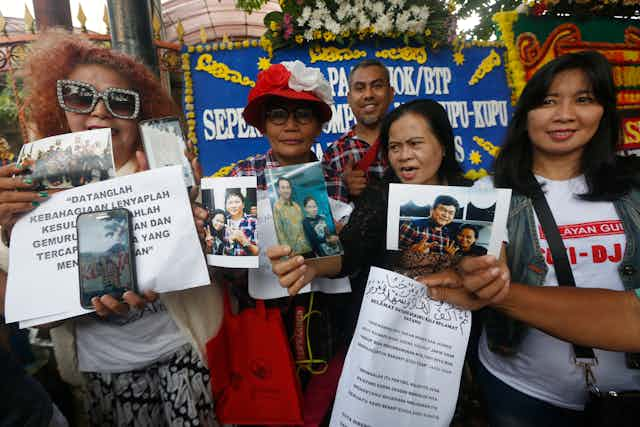The former Jakarta governor, Basuki Tjahaja Purnama, who is widely known by his Chinese name “Ahok”, has asked the public to call him by his initials, BTP, after being released from jail for insulting Islam, Indonesia’s main religion.
He made the request in a letter uploaded to his personal Instagram account ahead of his release from the prison.
The letter did not explain the reason for his decision. Some experts have considered it an effort to establish a new and better self-image. Based on theories on psychology, I think his action might have been an effort to reconcile with his enemies who have been attacking him for his ethnicity.
But its effectiveness remains questionable.
Reducing frictions
In 1966, President Soeharto issued a policy requiring Chinese Indonesians to use Indonesian names. This policy aimed to strengthen their Indonesian identities. As a result, Chinese Indonesians during that time had two names: one Chinese and one Indonesian. Their descendants usually have only one name, either Western or Indonesian.
After then president Abdurrahman Wahid (Gus Dur) issued a policy to abolish several regulations that discriminated against Chinese Indonesians in 2000, Chinese names for Chinese Indonesians were not a problem until Ahok recently decided to change his Chinese name.
His new name sparks discussions about frictions in society between the majority Muslim Indonesians and minority Chinese Indonesians.
It is possible he is trying to reduce these frictions by adopting an Indonesian name, hoping that the community will accept him back. Shared social identity can indeed be one of the important factors in conflict reconciliation.
Common ingroup identity for reconciliation
In social theory, finding common ground in society can be considered as an effort to form a shared identity – a psychological concept known as common ingroup identity.
By changing his name, BTP wants to tell people he has shared his identity with those who opposed him because of his ethnicity.
The results of shared identity have been investigated in various countries that have undergone a process of reconciliation. These countries include Northern Ireland, Chile and Bosnia Herzegovina.
These studies show that conflict between groups can be solved if the conflicting parties prioritise their shared identity. This identity includes national identity as it can foster the sense of togetherness that comes from being an entity.
Is it effective?
Although adopting the new name of BTP could provide a sense of shared identity, whether it solves his problem remains to be seen.
His new initials are still incapable of eliminating existing religious differences. The Christian Ahok was convicted and imprisoned for insulting Islam, the main religion in Indonesia.
My latest survey, involving 1,200 respondents nation-wide, shows that Indonesians are more comfortable interacting with people from different ethnic groups than with those from different religions.
Meanwhile, a study of the 2017 Jakarta gubernatorial election shows that one of the issues BTP’s rivals used to beat him and send him to prison is his identity as a non-Muslim, not his ethnicity.
In Indonesia, maintaining harmonious relations between religious groups has proven to be a challenge. Indonesians find it difficult to ignore their religious identity because religious identity is essential for them.
In most cases, minorities are reluctant to adopt a shared identity to avoid conflict. This is because shared identity is generally followed by submission to the majority. This will put the uniqueness of minority group identity at risk.
However, in the Indonesian context, it is the majority that is apparently reluctant to adopt this strategy. This is because Indonesian people hold firmly to their religious values. No matter how hard the minority group tries to show they are Indonesians, the majority still does not consider them as part of them.
Applied both ways
Like any other interpersonal conflict, it requires two to tango to resolve conflicts.
In the BTP case, we have seen his initiative to resolve the conflict. But, so far, there seems to be no similar effort by his opponents.
This might be because the blasphemy case was only the tip of the iceberg. Underneath, there are more fundamental social tensions to be resolved. Conservative Muslims targeted BTP in a movement that represents solidarity between Muslims to express anger at social inequality under his administration.
Therefore, for me, the solution for Ahok is to encourage reconciliation between Muslim Indonesians as the majority group and Chinese Indonesians as a minority.
It is important to remember that reconciliation requires efforts from both sides, even though Indonesian Muslims may find it difficult to accept the minority.
There needs to be mutual understanding between both sides to resolve the conflict.
Jamiah Solehati has translated this article from Indonesian


